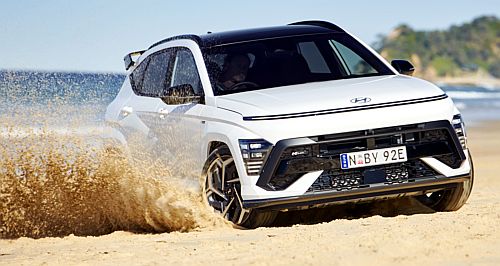Make / Model Search
News - HyundaiHyundai’s hybrid pushFirst it was Ioniq, then Santa Fe – now Kona, i30 and Tucson line up to be electrified3 Jul 2023 HYUNDAI Australia is preparing to quadruple its hybrid offering in the coming months, with the brand announcing it will soon add petrol-electric versions of its Kona small SUV, i30 small sedan and Tucson medium SUV.
The news came at the launch of the new-generation Kona, which will offer a broader range of powertrains than ever, including a new petrol-electric hybrid model, due here in a few months.
Joining that model will be the first-ever hybrid i30 sedan, followed by a petrol-electric take on the popular Tucson SUV, which is expected to arrive early next year.
Hyundai Australia chief operating officer John Kett, told media at the Kona launch that hybrid represents a sizeable opportunity for the brand, and that Toyota Australia has paved the way for it to potentially be more successful than it might have otherwise been.
“We want to see the volume that we're getting today in Tucson, and see if hybrid can actually grow it, not necessarily cannibalise it,” said Mr Kett.
“Other than announcing today that we're going to have one, we haven't gotten to pricing. Our aspiration of what we want to achieve? I don't think you'd have to be working inside to work out what (we) would like to do,” he said.
GoAuto understands that Hyundai is likely to follow the same sort of product planning with the new Tucson HEV hybrid as is seen with the Santa Fe HEV.
In that model line, only the top two specifications can be specified with hybrid power: the hybrid-powered Elite ($63,000 before on-road costs) and Highlander ($69,550 + ORC) that both carry a premium of $3000 over the diesel equivalents – which in turn works out to be a significant $6500 premium over the equivalent petrol V6 models.
What this means for the i30 Sedan range remains unclear, as it kicks off at $26,000 + ORC for the Active and jumps to $32,000 + ORC for either the Elite or the turbocharged N Line while the N Line Premium is $39,000 + ORC.
Given that in the Kona range the hybrid premium is $4000 over the non-turbo-petrol models, it would stand to reason that the hybrid versions of the i30 Sedan may follow suit, giving Hyundai a suitably priced competitor to the Toyota Corolla hybrid sedan (from $31,680 to $39,620 + ORC).
Interestingly, the hybrid front-wheel drive version of the new-gen Kona is positioned at parity with the turbo-petrol all-wheel drive model – if buyers elect to have the N Line version of the hybrid Kona.
Hyundai Australia product planning manager, Chris Saltapidas, said the brand has high aspirations for hybrid take-up in the new-gen Kona range – though he added that 2023 will not give a good indication of the true potential for the hybrid models as there is a staggered rollout of the model range.
Petro Kona variants are arriving first, with hybrid and battery electric options arriving later this year.
“By the end of next year, we're hoping that hybrid will be the major volume,” said Mr Saltapidas, who indicated that Hyundai expected 40-50 per cent of new-generation Kona sales to be petrol-electric in Australia.
“If we look at, say, N Line pack, where we're also targeting a really high take rate, as you saw earlier, for the whole business, we're doing over 28 per cent. For N Line on (first-generation) Kona at the moment is just under 20 per cent, but it's restricted to just one powertrain and now that we offer it across everything, we'd love to expand that.”
The new hybrid-powered Kona small SUV is priced just $4000 over the entry-level 2.0-litre non-turbo petrol version, with an enticing entry-level electrified price point of $36,000 + ORC, while the Kona Premium, which adds a number of specification differentiators, is a $40,000 + ORC proposition.
It is a move that sees the Korean brand target the likes of the Toyota Corolla Cross hybrid (from $35,550 + ORC) and GWM Haval Jolion hybrid (from $36,990 drive-away), and Hyundai Australia expects the hybrid model could eventually form the majority of sales within the petrol-derived model range.
The Kona hybrid models use a 1.6-litre non-turbo four-cylinder petrol engine, teamed to an electric motor integrated into a six-speed dual-clutch automatic gearbox, combined with a 1.32kWh lithium-ion battery pack. The combined outputs for the powertrain are 104kW of power and 265Nm of torque, and the official combined cycle fuel consumption figure is 3.9 litres per 100km.
It is expected that the same powertrain will feature in the facelifted hybrid i30 sedan, as the two models share a platform. Further, it is the same hybrid powertrain that is seen in the Kia Niro SUV which, intriguingly, comes in at a much higher price point (from $44,380 + ORC).  Read more |
Click to shareHyundai articlesResearch Hyundai Motor industry news |












Facebook Twitter Instagram